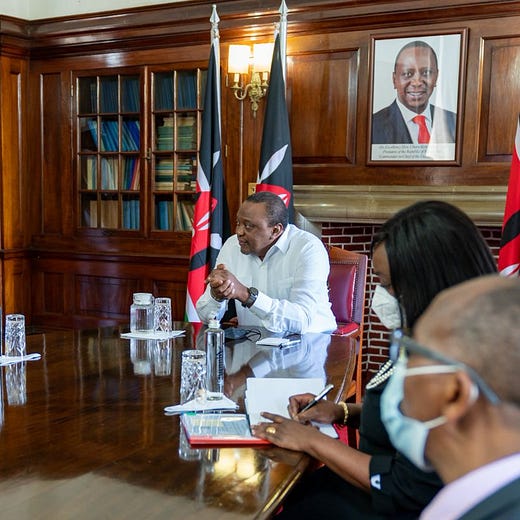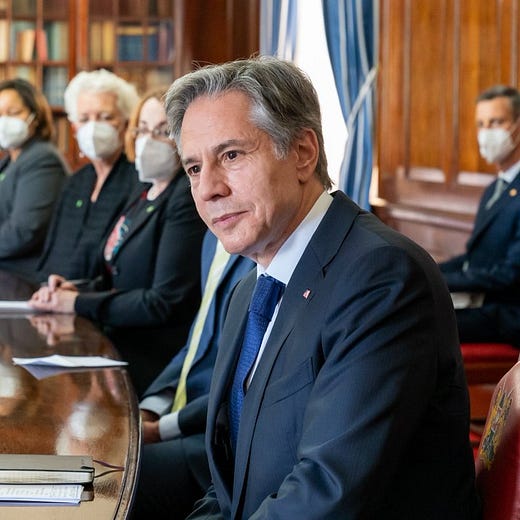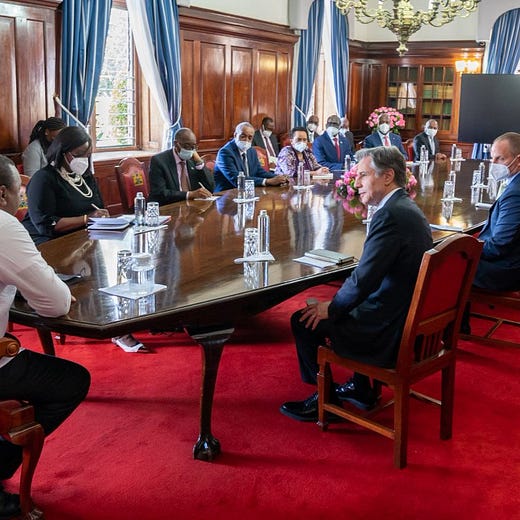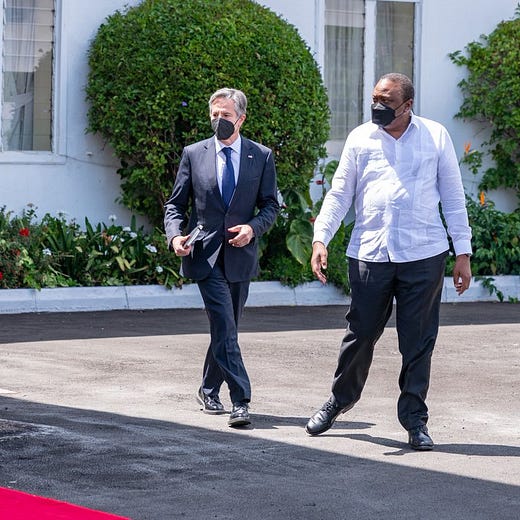This is the web version of Foreign Exchanges, but did you know you can get it delivered right to your inbox? Sign up today:
Due to a prior commitment today’s roundup is being sent out a bit earlier than usual. We’ll catch up on events in tomorrow’s subscriber-only newsletter.
THESE DAYS IN HISTORY
November 17, 1869: The Suez Canal officially opens in a joint French-Egyptian ceremony. Although it quickly came under financial pressure due to the costs of construction and some technical flaws that required improvements, the canal made an immediate impact on international commerce, both for better and worse (it helped cause the Panic of 1873 because of its detrimental effect on British maritime trade). The Egyptian monarchy’s heavy debt obliged it to sell its shares in the canal to the British government, which provided an opening for Britain to establish control not only over the canal, but ultimately over all of Egypt.
November 18, 1803: The Battle of Vertières, the final major battle of the Haitian Revolution, results in a decisive Haitian victory over a heavily outnumbered French expeditionary army. The French, under the Vicomte de Rochambeau, negotiated their withdrawal from the island and Haitian leader Jean-Jacques Dessalines declared independence on January 1, 1804.
November 18, 1916: The Battle of the Somme, which had begun on July 1, ends with over one million dead and wounded in total and only very minor Allied tactical gains to show for it. Strategically the battle did help the green British army gain experience while forcing Germany into a war of attrition that it couldn’t possibly sustain. But mostly Somme stands as the best example of the meat grinder approach to war and the callous indifference to lower rank casualties among the officer class that marked World War I.
INTERNATIONAL
In today’s global news:
Worldometer is tracking COVID-19 cases and fatalities.
The New York Times is tracking global vaccine distribution.
MIDDLE EAST
YEMEN
The Saudi-led coalition said early Thursday that it was undertaking a major air operation targeting Houthi drone, missile, and communications facilities across much of northern Yemen. This was apparently in response to an attempted Houthi drone attack on Saudi Arabia’s Abha airport on Wednesday. The Saudis claim their air defenses intercepted the drone. There’s no confirmed information about Thursday’s airstrikes or any damage they might have caused to Houthi infrastructure and/or collateral civilian sites.
While we’re on the subject of Saudi airstrikes, Agence France-Presse reported on Thursday, based on information from “sources close to the rebels,” that the Houthis have lost almost 15,000 fighters in combat around Maʾrib city since June. Most of them have been killed in Saudi airstrikes. The Houthis almost never officially acknowledge their casualties so this is as close as we’re likely to get to an actual admission of losses. The pro-government side has lost some 1200 combatants near Maʾrib over the same period. Despite that lopsided tally the Houthis have slowing advanced on the city, though one assumes at some point those losses are going to become unsustainable.
The US Treasury Department on Thursday sanctioned Houthi military commander Saleh Mesfer Alshaer over allegations of illegal property seizure and extortion. In a statement announcing the blacklisting the department claimed that Alshaer has seized some $100 million in property on the Houthis’ behalf.
IRAQ
Muqtada al-Sadr called on Thursday for Iraqi militias to rid themselves of “undisciplined elements” and “corrupt individuals,” and to surrender their weapons to the Iraqi state. Needless to say they’re not going to do this—one senior militia official expressed some openness to the idea as long as Sadr’s own militia also disarmed along with the Kurdish peshmerga, which also isn’t happening—but Sadr’s comments highlight the growing discord within Iraq’s Shiʿa community between the Sadrist faction and a pro-Iranian faction that includes the militias and their political allies.
That divide could complicate efforts to form a new government, a process Sadr now controls since his party emerged with more seats than any other after last month’s election, though I’m not sure how much of an effect it will have. In a country with a “normal” political system the militias and company might go into the opposition for a term, but in Iraq, where every government is basically a national unity government, I suspect the militia leaders will opt to work with Sadr rather than against him—even if they don’t like one another very much.
IRAN
Three police officers in southern Iran’s Kerman province were killed on Wednesday in a confrontation with a group of what authorities termed “bandits” near the provincial border with Sistan and Baluchistan province. Two of the “bandits” were also reportedly killed. Authorities didn’t specify the Bad Guys in this incident but did say they were part of a group that has a “long history of evil and instability in the southeastern region.” That suggests Baluch militants, possibly Sunni/Salafi Islamists, though it could also refer to smugglers.
US authorities on Thursday charged two Iranians, and the Treasury Department sanctioned six more plus one entity, over allegations of an attempt to influence the 2020 US presidential election. The two Iranians facing criminal charges apparently hacked a state voter database and took information on some 100,000 voters, while the others are accused of peddling “disinformation.” There’s no evidence that their efforts had a material effect on the election.
Several Iranian officials are claiming that some $3.5 billion in hitherto frozen Iranian assets have been unfrozen by…somebody. The Iranian government is apparently putting those funds to commercial use. This story is very light on the details as the Iranians aren’t saying which country unfroze the funds, nor have they offered any indication as to why they were unfrozen. It’s possible the Biden administration requested their release in an effort to generate some goodwill ahead of the resumption of talks on restoring the 2015 Iran nuclear deal, in which case it would make sense that the administration wouldn’t want any details to be made public.
ASIA
TAIWAN
The Taiwanese government officially opened its “Taiwanese Representative Office” in Lithuania on Thursday, much to Beijing’s chagrin. The office will serve as a de facto embassy, which is not that unusual as Taiwan has similar offices in many other countries, but this one has provoked outrage from the Chinese government in part because the name is such an explicit suggestion of Taiwanese independence. It’s a diplomatic coup for Taipei, which has seen a number of countries cut ties with it and open them with Beijing in recent years.
Amid reports that the Biden administration has increased the US military deployment in Taiwan, Responsible Statecraft’s Nick Turse reports that the Pentagon is still not openly acknowledging that deployment. But it is acknowledging an expanding special forces footprint in the “Indo-Pacific” as part of the overall pivot toward confrontation with China:
Late last month, Taiwan’s President Tsai Ing-wen confirmed the presence of U.S. troops on the island in the wake of a Wall Street Journal report that U.S. Special Operations forces and Marines were “secretly operating” in her country.
While the Journal reported that U.S. commandos were there to train local forces as “part of efforts to shore up the island’s defenses as concern regarding potential Chinese aggression mounts,” Gen. Richard D. Clarke, the chief of U.S. Special Operations Command (SOCOM), demurred when asked about Tsai’s comments and the U.S. presence.
Taiwan was, in fact, absent from an official list, provided by SOCOM to Responsible Statecraft, of countries that saw deployments of U.S. commandos in 2021. But Special Operations Command did admit to involvement in 10 other nations in the Indo-Pacific region, including Australia, India, Japan, South Korea, the Maldives, Mongolia, Palau, the Philippines, Singapore, and Thailand.
CHINA
Just before this week’s big Joe Biden-Xi Jinping summit, Chinese authorities released US national Daniel Hsu, who had spent four years stuck in China under an exit ban. The US returned seven Chinese nationals who had legally been kicked out of the United States but had not yet been sent back to China. This has the look of a prisoner exchange (setting aside the fact that Hsu wasn’t a “prisoner” technically), but US officials are rejecting that characterization. And in a sense they’re right—these seven Chinese nationals had been expelled from the US, so US authorities wanted (officially at least) to repatriate them. Their return to China wasn’t really a concession from Washington. Regardless this seems like a helpful trust-building exercise. The US has been claiming that several other Americans are in the same situation as Hsu, being denied exit from China. His release could be the first of many.
AFRICA
SUDAN
US ambassador to the United Nations Linda Thomas-Greenfield visited Israel earlier this week. While she was there, Al-Monitor’s Rina Bassist is reporting that she asked Israeli officials to “intervene” in Sudan’s political crisis, to urge its military junta to reverse last month’s coup and restore the civilian transitional government. If true that would be the second time the Biden administration has asked Israel to pressure Khartoum since the coup. It seems unlikely that they will. Israeli leaders are keen to have the Sudanese government ratify their “Abraham Accords” agreement to normalize Sudanese-Israeli relations. Sudan’s previous civilian government was at best lukewarm toward that agreement while the military known to be strongly in favor of it. So it’s better from Israel’s perspective if the military remains in charge.
LIBYA
The former interior minister in western Libya’s Government of National Accord, Fathi Bashagha, has joined an increasingly crowded field ahead of next month’s presidential election. Bashagha was known to be particularly close with Turkey, the GNA’s main foreign backer, which gives both Turkey and Russia (in the person of Khalifa Haftar) proxies in the race.
NIGERIA
The US Commission on International Religious Freedom has issued its annual report, which always triggers a State Department review of US designations related to the issue of religious freedom around the world. Of note in this year’s process was the department’s decision to remove Nigeria from its “countries of particular concern” list even though the USCIRF had recommended that it remain on the list. The department also left off India, Syria, and Vietnam despite USCIRF’s recommendations, but commission chair Nadine Maenza issued a statement saying that USCIRF was “especially displeased” with Nigeria’s removal. Coincidentally, or not, Secretary of State Antony Blinken is set to visit Nigeria this week as part of a tour of Africa that the Biden administration clearly views through the lens of the US-China rivalry.
ETHIOPIA
The US government is now warning airlines and pilots of the possibility of ground-to-air fire in and around Addis Ababa, given the possibility that Tigray People’s Liberation Front fighters may try to advance on the Ethiopian capital. International diplomatic efforts to forestall that possibility are ongoing, with US Horn of Africa envoy Jeffrey Feltman and African Union envoy Olusegun Obasanjo both heading to Ethiopia on Thursday to try to make some progress. Blinken has also discussed the Ethiopian conflict with Kenyan President Uhuru Kenyatta during his visit to Kenya on Wednesday.
Kenyatta spoke with Ethiopian Prime Minister Abiy Ahmed over the weekend and apparently came away with the impression that Abiy is now more open to a diplomatic resolution than he’d been previously. That might have something to do with the fact that rebel TPLF forces are now within striking distance of his capital. Abiy’s government has reportedly released several UN personnel it had arrested, all of them ethnic Tigrayans, which is a concession to the international community though authorities are still holding a few UN workers in custody.
UGANDA
Ugandan authorities said Thursday that police have killed five people and arrested another 21 in connection with terrorist bombings in Kampala earlier this week. One of those killed was a cleric believed to have recruited fighters for the Islamist Allied Democratic Forces group, which was likely responsible for the bombings. Another four were killed as they attempted to cross into Uganda from the Democratic Republic of the Congo, where ADF has its largest presence.
EUROPE
New polling from YouGov and the Cambridge Globalism Project finds support for populism declining across Europe:
In France, the percentage of adults who said they believed that “the will of the people should be the highest principle in this country’s politics”, a key populist tenet, fell from 66% in 2019 to 62% in 2020 and 55% in 2021, the survey found.
Other EU countries showing the same sharp fall included Germany (66%, 63%, 61%), Denmark (61%, 56%, 50%), Spain (75%, 68%, 65%), Italy (72%, 71%, 64%) and Poland (80%, 71%, 65%), as well – outside the bloc – as Britain (66%, 60%, 56%).
Fewer people also seem to be agreeing with the statements “my country is divided between ordinary people and the corrupt elites who exploit them,” “a lot of important information is deliberately concealed from the public out of self-interest,” and “the power of a few special interests prevents our country from making progress.”
BELARUS
There are signs that the migrant crisis on Belarus’s borders is abating, after a Wednesday phone call between Belarusian President Alexander Lukashenko and German Chancellor Angela Merkel seemed to pull Minsk and the European Union back from the brink somewhat. Belarusian security forces on Thursday cleared out several makeshift camps that had been established along the Belarusian-Polish border in recent weeks, as migrants made their way to Belarus in hopes of crossing into the EU amid what Polish and other European officials argued was a “hybrid war” being waged by Lukashenko in response to EU sanctions. Hundreds of Iraqi nationals also reportedly began boarding repatriation flights. Belavia, Belarus’s state airline, has also stopped carrying Afghan, Iraqi, Lebanese, Libyan, Syrian, and Yemeni nationals to Minsk.
However, there remains a disagreement about the fate of some 2000 migrants who are now apparently on the Polish side of the border. Lukashenko suggested to Merkel that the EU take in those migrants while he would repatriate some 5000 still in Belarus. European officials, displaying the compassion and intense focus on human rights that has time and again marked their behavior in this incident and indeed their approach toward immigration in general, are refusing to accept them. On a related note, a one-year old Syrian child died on the Polish side of the border early Thursday. If nothing else, the move to shut down those encampments means their former occupants are now being sheltered indoors amid freezing temperatures in the region.
AMERICAS
UNITED STATES
The renewed US leadership on climate change that Joe Biden touted during his visit to the COP26 climate summit a couple of weeks ago lasted, well, about a couple of weeks. The Biden administration on Wednesday auctioned off about 80 million acres of primo Gulf of Mexico real estate containing enough oil and natural gas to, if fully exploited, pretty much ensure that humanity will be unable to keep global temperature increases below catastrophic levels. Way to go everybody! I guess we should note that the administration conducted the auction under duress, or at least it claimed to be doing so under duress, after a federal court ruled earlier this year that the administration could not put a hold on leasing drilling rights to federal land. Not too many people outside the administration seem to agree that its hands were tied, however, arguing that even with its blanket hold overruled by the court the administration could still have put holds on individual lease deals. Me personally I wonder why they didn’t just tell the court to piss off, but I guess that would have upset The Norms so that’s the ball game. Perhaps literally.
Finally, and while we’re on the subject of things the Biden administration really should be doing differently, The New Republic’s Blaise Malley looks back at its laughably meaningless review of US sanctions policy:
In the summer of 2020, as countries around the world struggled to survive the early surge of the pandemic, battling both economic and public health crises, a number of nations had to face the compounding effects of devastating sanctions imposed by the United States. In Syria, doctors were unable to rebuild hospitals or import medical goods. And in Iran, the Brookings Institute estimated that between May and September, there were about 13,000 additional deaths as a result of U.S. sanctions. Although in theory these sanctions should contain certain humanitarian exemptions, companies often over-comply with rules out of fear of being punished. The Trump administration refused to ease these sanctions, and the consequences were catastrophic.
This October, in response to these and other concerns, the Biden administration published its review of current foreign sanctions policy. This was in keeping with a promise Biden made to voters: Throughout his campaign, he pledged to reorient his foreign policy around diplomacy and human rights. True to form, within a few days of assuming office, the Treasury announced that it would be looking into the way sanctions had been strategically deployed, signaling that a long overdue reconsideration was coming. But the result, a nine-page memo, did little more than spell out a number of accepted realities: that U.S. sanction use has grown in the last 20 years; that the composition of sanctions has changed during that time frame; and that sanctions can have a material cost on adversaries. Overall, the review seemed to avoid any serious self-reflection or criticism. It was hardly surprising that advocates of sanctions reform offered dim reviews of the effort.






